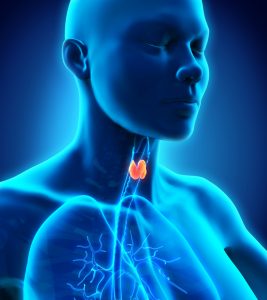Written by Harold Oster, MD. Results suggest that vitamin D deficiency is associated with impaired thyroid hormone sensitivity in euthyroid adults.
 Thyroid hormone affects most organ systems. Impaired sensitivity to thyroid hormones has been seen in patients with hypertension, atherosclerosis, and metabolic syndrome1,2. Vitamin D deficiency is associated with bone loss, infectious diseases, and multiple endocrine disorders3. Studies examining a link between vitamin D deficiency and thyroid disease have had conflicting results4.
Thyroid hormone affects most organ systems. Impaired sensitivity to thyroid hormones has been seen in patients with hypertension, atherosclerosis, and metabolic syndrome1,2. Vitamin D deficiency is associated with bone loss, infectious diseases, and multiple endocrine disorders3. Studies examining a link between vitamin D deficiency and thyroid disease have had conflicting results4.
Liyuan Zhou et al. studied the association between vitamin D deficiency, defined as a serum level below 20 ng/ml, and impaired sensitivity to thyroid hormones in euthyroid adults. Based on defined inclusion criteria, 3143 patients from a single hospital in Beijing participated in the study. Physical examinations were performed on the participants, and blood was analyzed for markers of thyroid hormone sensitivity, liver function, kidney disease, lipids, glucose, and other possible covariables of thyroid disease. Thyroid-stimulating hormone (TSH), free T4 (FT4), and free T3 (FT3) were measured. These levels are typically elevated in patients with impaired thyroid hormone sensitivity. Specific markers for impaired sensitivity to thyroid hormones tested were the thyroid feedback quantile-based index (TFQI), parametric thyroid feedback quantile-based index (PTFQI), thyroid-stimulating hormone index (TSHI), and thyrotrophic thyroxine resistance index (TT4RI), all of which are higher in people with impaired thyroid hormone sensitivity. The FT3 to FT4 ratio (FT3/FT4) was calculated and is expected to be lower in individuals with impaired peripheral sensitivity to thyroid hormones5.
The authors noted the following:
- 1849 (58.8%) of the participants were vitamin D deficient.
- TSH, FT3, and FT4 levels, though still in the normal range, were higher in the vitamin D deficient group.
- TFQI, PTFQI, TSHI, and TT4RI were elevated in the participants with vitamin D deficiency, compared to those who were not deficient.
- There was no difference in FT3/FT4 in the vitamin D deficient participants.
- Vitamin D levels were negatively correlated with TSH, FT3, FT4, and the indices of impaired sensitivity to thyroid hormones in women and men. Adjustment for covariables did not affect the correlation.
- In the vitamin D deficient group, the proportion of participants with impaired sensitivity to thyroid hormones as evaluated by the various indices was higher than in the group with sufficient levels of vitamin D.
- After adjustment for age and measured covariables, women had a stronger correlation between vitamin D deficiency and impaired sensitivity to thyroid hormones than men.
Results of the study suggest that vitamin D deficiency is associated with impaired sensitivity to thyroid hormones. Limitations include possible confounding by lifestyle and environmental factors.
Source: Zhou, Liyuan, Ying Wang, Jingru Su, Yu An, Jia Liu, and Guang Wang. “Vitamin D Deficiency Is Associated with Impaired Sensitivity to Thyroid Hormones in Euthyroid Adults.” Nutrients 15, no. 17 (2023): 3697.
© 2023 by the authors. Licensee MDPI, Basel, Switzerland. This article is an open access article distributed under the terms and conditions of the Creative Commons Attribution (CC BY) license (https://creativecommons.org/licenses/by/4.0/).
Click here to read the full text study.
Posted September 12, 2023.
Harold Oster, MD graduated from medical school in Miami, Florida in 1992 and moved to Minnesota in 2004. After more than 25 years of practicing Internal Medicine, he recently retired. Dr. Oster is especially interested in nutrition, weight management, and disease prevention. Visit his website at haroldoster.com.
References:
- Lv F, Cai X, Li Y, et al. Sensitivity to thyroid hormone and risk of components of metabolic syndrome in a Chinese euthyroid population. J Diabetes. Jul 10 2023;doi:10.1111/1753-0407.13441
- Ding X, Wang Y, Liu J, Wang G. Impaired Sensitivity to Thyroid Hormones Is Associated With Elevated Homocysteine Levels in the Euthyroid Population. The Journal of clinical endocrinology and metabolism. Aug 18 2022;107(9):e3731-e3737. doi:10.1210/clinem/dgac371
- Amrein K, Scherkl M, Hoffmann M, et al. Vitamin D deficiency 2.0: an update on the current status worldwide. Eur J Clin Nutr. Nov 2020;74(11):1498-1513. doi:10.1038/s41430-020-0558-y
- Kim D. The Role of Vitamin D in Thyroid Diseases. Int J Mol Sci. Sep 12 2017;18(9)doi:10.3390/ijms18091949
- Yang S, Wang Z, Li J, Fu J, Guan H, Wang W. Thyroid Feedback Quantile-Based Index Is Associated With Blood Pressure and Other Hemodynamic Measures: A Cross-sectional Study. Endocr Pract. Oct 2022;28(10):1055-1061. doi:10.1016/j.eprac.2022.07.010
